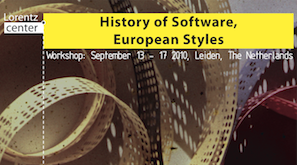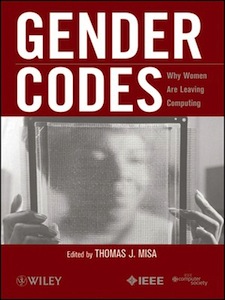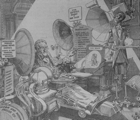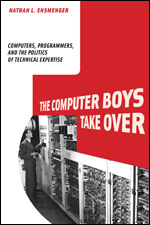History of Software, European Styles
September 12, 2010 #media #research

On September 13 I will be giving a keynote address at the Software for Europe conference at the Lorentz Center for the Sciences in the Netherlands. The talk will focus on the work practices of computer operators in the late 1950s and early 1960s. Among other things, I will argue that computing is a much more human activity that we might otherwise imagine, even in the era of electronic computing. There were hundreds of thousands of computer workers employed in the first two decades following the invention of the electronic computer, and the “human element” in computing was frequently identified by contemporaries as the critical challenge facing the future of the commercial computing industry.
Gender Codes
September 09, 2010 #publications

A new anthology exploring the history and sociology of women in computing that developed out of the Charles Babbage Institute conference is now available from Wiley. My contribution is a chapter called “Making Programming Masculine.” The volume is edited by Thomas Misa of the Charles Babbage Institute, and is called Gender Codes: Why Women Are Leaving Computing. A draft version can be found here. The Gender Codes book can be ordered on Amazon.
The Information Age
September 03, 2010 #teaching

Certain new technologies are greeted with claims that, for good or ill, they must transform our society. The two most recent: the computer and the Internet. But the series of social, economic, and technological developments that underlie what is often called the “Information Revolution” include much more than just the computer. In this course, we examine what made this series of develop- ments seem so revolutionary, who said what about them, and why. We chart changing perceptions of information technologies as people begin to experience them as a part of everyday life and work. We will explore both the technologies themselves as well as their larger social, economic, and political context.These perspectives will inform our discussion of current issues such as life and censor- ship in ‘cyberspace’.
The Computer Boys Take Over!
August 21, 2010 #publications
The “computer revolution” of the mid-20th century is widely considered to be one of the defining moments of contemporary history. And yet very little is known about its principal revolutionaries, the computer programmers, systems analysts, and other technical experts who made possible the computerization of modern society. The story of how the “computer boys” took over, how they constructed for themselves a professional identity, and how they were simultaneously admired and resented by their corporate peers and employers, reveals the complex relationship between technological innovation, organizational politics, and social disruption that continue to define the relationship between computers and society.
Learn more about the book from MIT Press. Order it on Amazon. The website for the book can be found at thecomputerboys.com.
Managing your digital persona
February 22, 2010 #media

Academic careers are based on reputation, and for younger scholars at least part of that reputation is based on your online persona. But online personas are notoriously difficult to manage — unlike other forms of self-presentation, your online presence is only partially under your control.
On Monday, February 22, I will be speaking at the Graduate Student Center on the topic of managing your digital persona. Free lunch!
Inception in the Classroom
December 10, 2009 #media #teaching
In the last lecture of my Information Age course, I discussed the problem of privacy in the Internet era. As one of my examples, I referred to the popular campus blog Sleeping in Van Pelt which posts pictures of people – you guessed it – sleeping in Van Pelt Library. The next day, the site Sleeping in Van Pelt featured a picture of me lecturing in front of a huge video screen featuring an image of the website Sleeping in Van Pelt.
You see where this is going: next year, a website featuring me showing a picture of the website showing me showing a picture of the website…
An infinite number of ensmengers, going all the way down…


